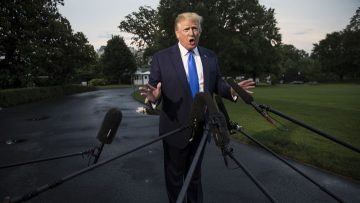James Fallows in The Atlantic:
 We’re seeing a huge error, and a potential tragedy, unfold in real time.
We’re seeing a huge error, and a potential tragedy, unfold in real time.
That’s a sentence that could apply to countless aspects of economic, medical, governmental, and environmental life at the moment. What I have in mind, though, is the almost unbelievable failure of much of the press to respond to the realities of the Trump age. Many of our most influential editors and reporters are acting as if the rules that prevailed under previous American presidents are still in effect. But this president is different; the rules are different; and if it doesn’t adapt, fast, the press will stand as yet another institution that failed in a moment of crucial pressure.
In some important ways, media outlets are repeating the mistake made by former Special Counsel Robert Mueller. In his book about the Mueller investigation, True Crimes and Misdemeanors (and in a New Yorker article), Jeffrey Toobin argues that Mueller’s tragic flaw was a kind of anachronistic idealism—which had the same effect as naivete. He knew the ethical standards he would maintain for himself and insist on from his team. He didn’t understand that the people he was dealing with thought standards were for chumps. Mueller didn’t imagine that a sitting attorney general would intentionally misrepresent his report, which is of course what Bill Barr did. Mueller wanted to avoid an unseemly showdown, or the appearance of a “fishing expedition” inquiry, that would come from seeking a grand-jury subpoena for Donald Trump’s testimony, so he never spoke with Trump under oath, or at all. Trump, Barr, and their team viewed this decorousness as a sign of weakness, which they could exploit.
More here.
